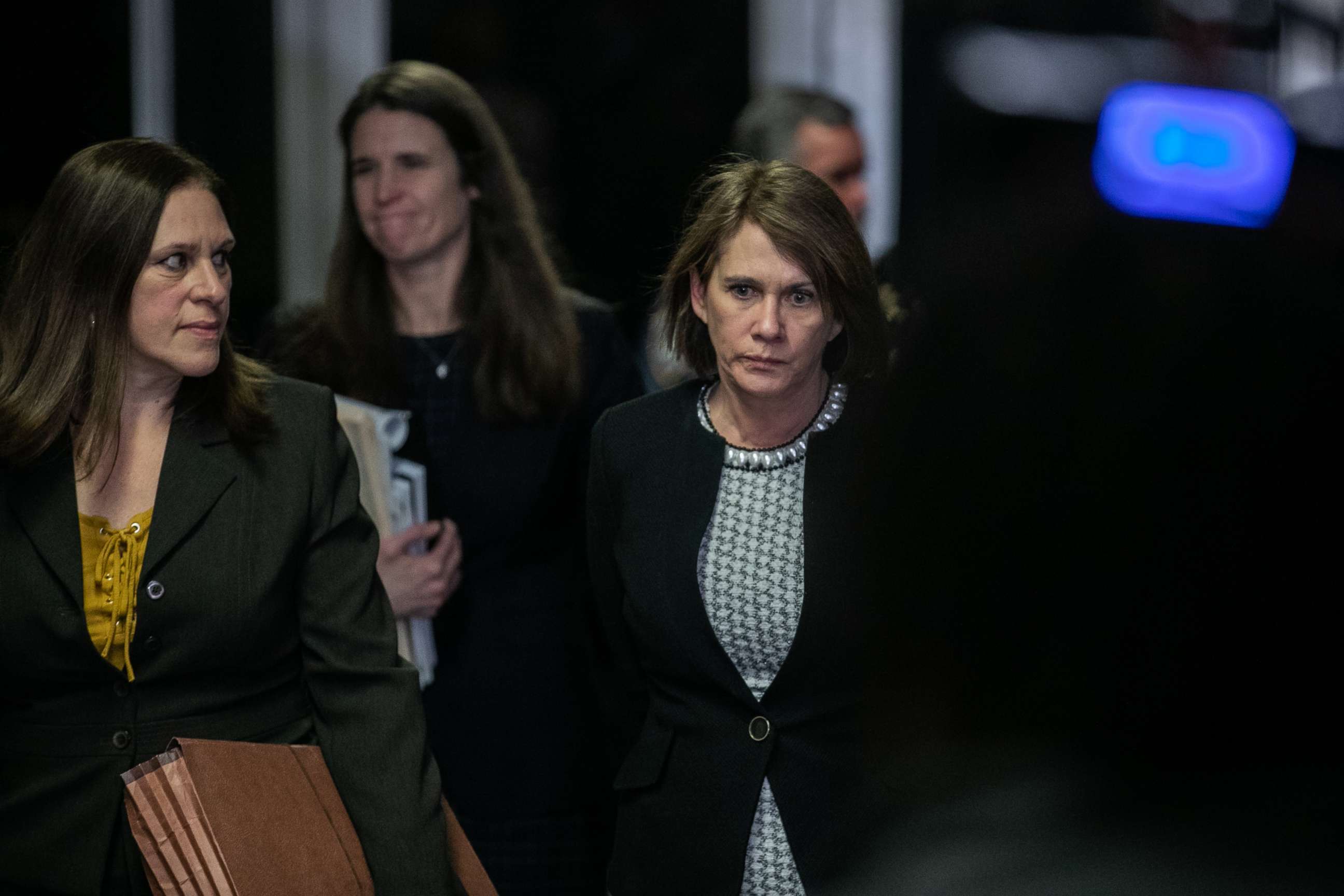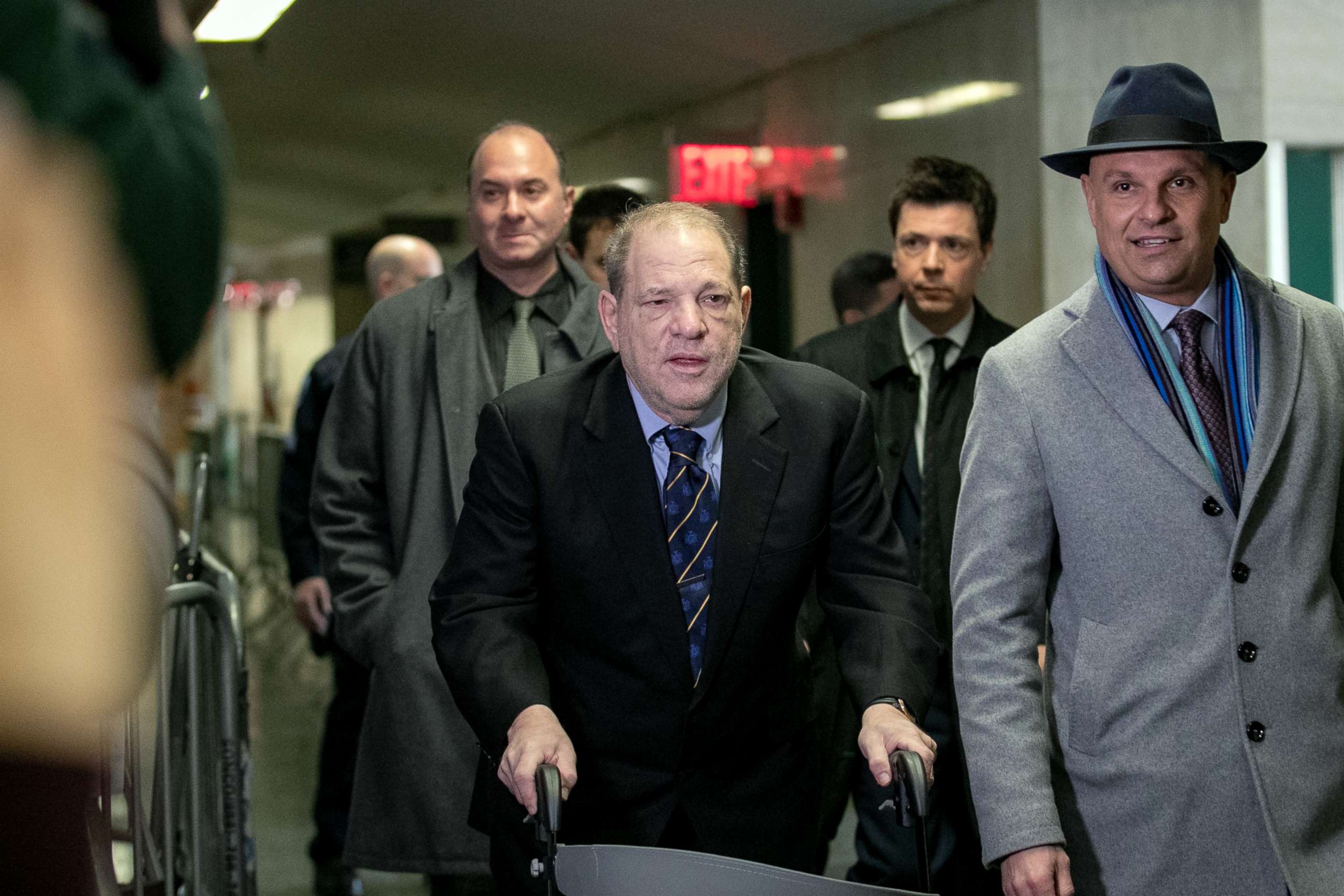Expert witness details 'rape myths' in Harvey Weinstein case
Weinstein is charged with five felony counts related to two women.
Prosecutors in the Harvey Weinstein rape and sexual assault trial on Friday called on veteran forensic psychiatrist Dr. Barbara Ziv, who previously testified at Bill Cosby's criminal trial last year.
As she did at the Cosby trial, Ziv outlined a series of what she described as "rape myths," widely held societal beliefs that are contradicted by statistical evidence and emerging research.
Under cross-examination, Ziv acknowledged that false reports could share many of the same characteristics of accurate reports, including delayed reporting and new details emerging years later. She also acknowledged a concept known as "relabeling" -- the idea that individuals can reinterpret incidents over time that cause them shame.
A total of six women are expected to testify that Weinstein sexually assaulted them. Weinstein is charged with crimes related to two of the six women, and the rest are being called in support of prosecutors' efforts to demonstrate a pattern of sexual predation. He's pleaded not guilty to all charges and denied ever engaging in non-consensual sex.
One of the women who accused Weinstein of rape is actress Annabella Sciorra. She testified on Thursday that Weinstein forced himself onto her at her New York apartment in either 1993 or 1994. Fellow actress Rosie Perez testified Friday how Sciorra told her of the alleged assault, after Perez had called her to go out for a night on the town.
"I called her up. I was in a pretty jovial mood," Perez testified, recalling herself saying, "Hey Annabella, let's go out!' She was talking in this very strange whisper of a voice as if she was hiding from someone. I said, 'What's wrong with you?' and she said, 'I think something bad happened.'"
"I think something bad happened," Sciorra replied, according to Perez. "'I think I was raped.' And the way she said it was so strange because she was still whispering."
"'Do you think it happened, or did it happen?" Perez persisted, according to the testimony. "And she said, 'I think it was rape,' and then she started to cry."
Perez went on to testify that she suspected Weinstein was the one who assaulted her friend after she heard rumors about the pair in London. Perez also said that during the phone call to Sciorra in London, she urged her to call the police, but Sciorra rejected the idea.
"She said she was scared that he was gonna get her again, and that's when I put two and two together -- and I said, 'He's the one that raped you,' and she said, 'How did you know?' And I said, 'I didn't know -- you confirmed my speculation,'" Perez testified Friday. "She told me that it was, in fact, Harvey Weinstein that raped her. She told me that he showed up at her door, that he pushed his way through the door and she was crying, and saying 'I tried to fight back, I tried.'"
During cross-examination, the defense asked Perez why she didn't go to the police after hearing that her friend thought she was raped.
"If you have a girlfriend who tells you something like that, you don't know what to do. You don't want to overstep your bounds. If she was my very, very, very good friend, you know," Perez began, before stopping to sigh. "It was shocking. I was in shock."
Towards the end of Perez's testimony, she broke down in tears when she acknowledged that she once broke her promise to Sciorra never to tell anyone about the alleged rape by Weinstein to journalist Nicole Wallace, a former co-host with Perez on ABC's "The View."
“I betrayed my promise to her to never tell anybody I knew,” Perez said, choking up at the recollection.
'The most underreported crime'
Ziv said there are many factors and reasons that go into a woman continuing to have contact with a person who sexually assaulted them or not reporting them.

"Many individuals who are sexually assaulted will tell somebody: a friend. Not everybody, but many," Ziv testified Friday. "Very few people then will report to a doctor or a counselor or a spiritual advisor, and then the next level is to law enforcement -- and even fewer report to law enforcement."
Ziv testified that delayed reporting "can range from days to weeks to months to years … to never. According to the Bureau of Justice Statistics, it is the most underreported crime."
Under cross examination by Weinstein defense attorney Damon Cheronis, Ziv acknowledged Cheronis' suggestion that it's possible for individuals to "relabel a consensual sexual encounter as non-consensual years later."
"Anything is possible," she responded. "It's not usual."
She acknowledged early in her testimony that she hadn't interviewed or assessed anyone involved on either side of the Weinstein case. Ziv insisted that she hadn't followed news reporting on the Weinstein case at all since she was first contacted by Manhattan prosecutors in early 2018.
Ziv also confirmed that she works for insurance companies -- currently overseeing case managers as part of a position she holds at the insurance firm Aetna, similar to a job she previously worked at Cigna.

Cheronis sought to unwind some of the broad statements she made under direct examination.
"Do you think if something happens in closer proximity and [a victim] reports it sooner, it's going to be more accurate?" Cheronis asked.
"I think you can say that about a lot of things, yes," Ziv replied, displaying a repeated impatience with what she described as "oversimplifications" of her written work and testimony in previous cases. "I think that's generally true."
Asked to define the term "relabeling," Ziv said that "relabeling is when you experience something and over time you sort it in sort of different bucket in your memory."
"Could an individual reinterpret things they've done that they regret?" Cheronis asked.
"Yes," she replied.
Asked whether she was familiar with the term "consensual unwanted sex," Ziv said she was, but called it "one of the most ridiculous concepts, and not accepted in any field I know of."
If you or someone you know experienced sexual assault and is seeking resources, call the National Sexual Assault Hotline at 1-800-656-HOPE (4673).




